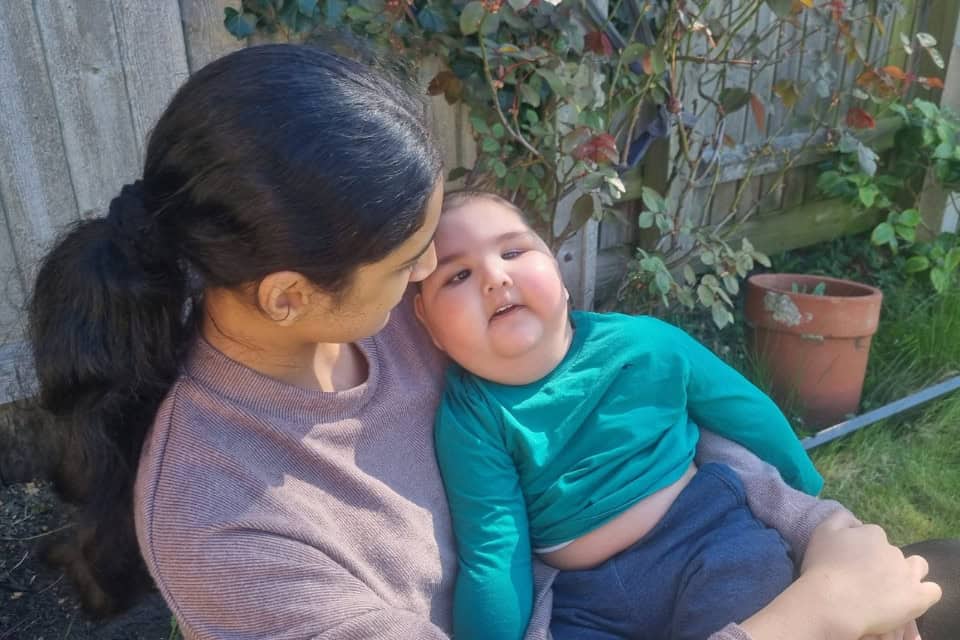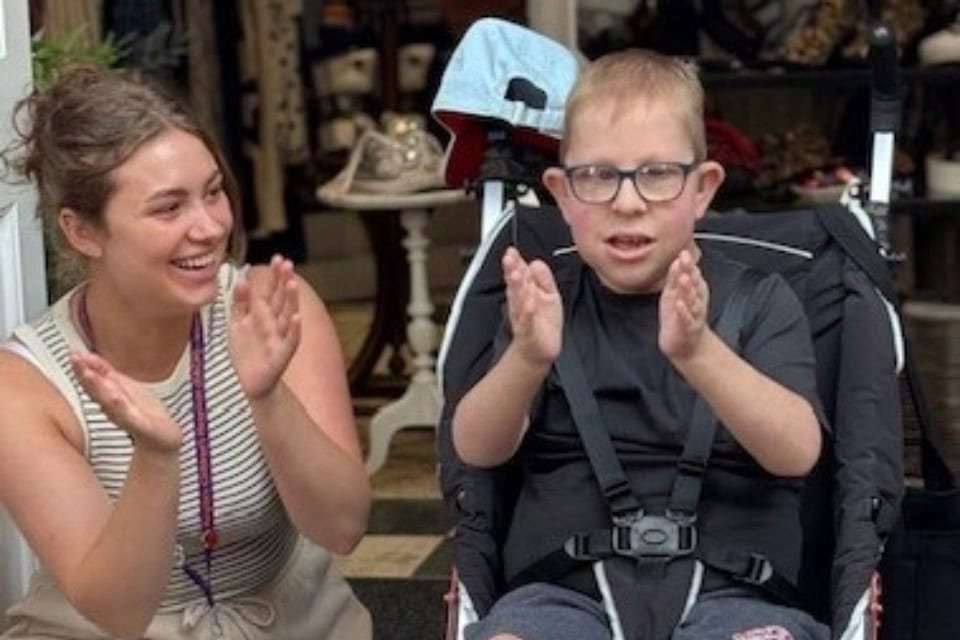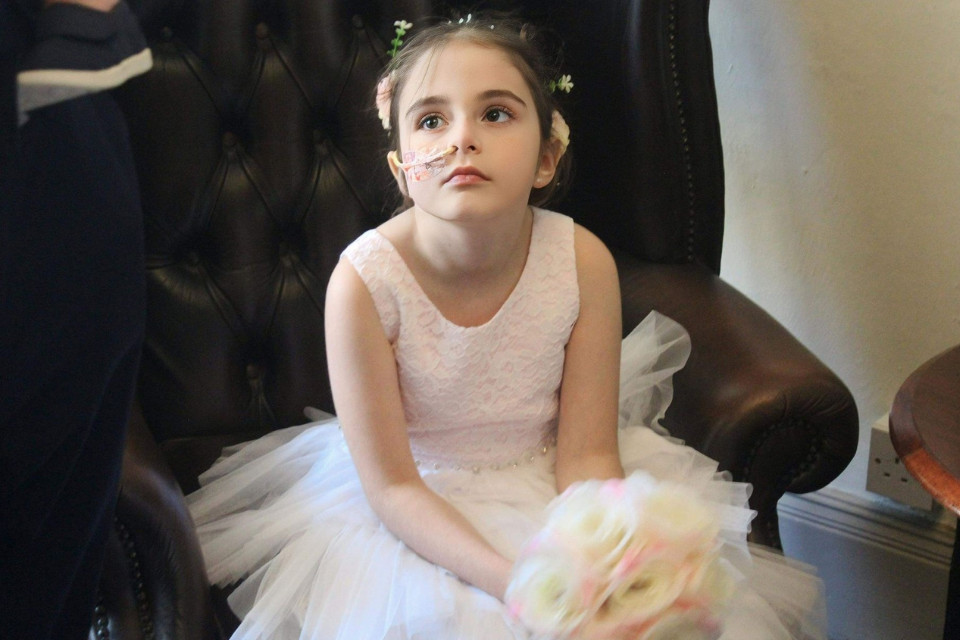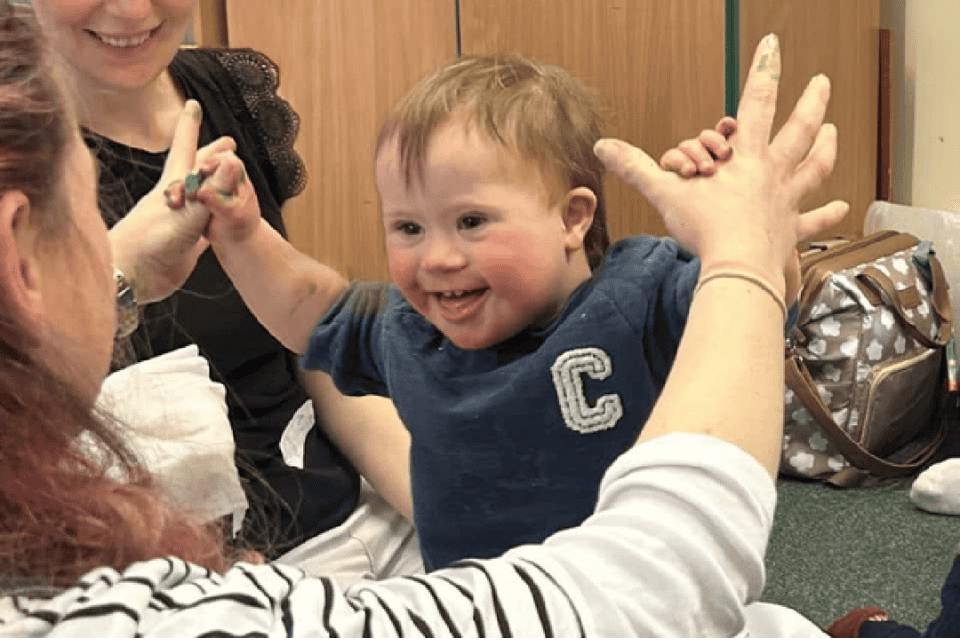Est. read time – 5-6 minutes.
Zak Asif is a little boy with a cheeky smile, spirit and resilience that has a positive impact on his whole family.
The one-year-old, who celebrates his second birthday next month, has the rare genetic condition Galloway-Mowat Syndrome and receives care from East Anglia’s Children’s Hospices (EACH).
He was diagnosed at nine months, is unable to sit independently and uses a special feeding tube. The disorder also impacts his kidneys.
Despite the challenges he faces, mum Farzana describes him as a happy, bubbly and spirited baby who has made their whole family stronger and tighter knit.
“Zak’s taught us all to be more resilient,” she said.
“I’ll often say ‘look at Zak. Think about what he’s going through and look how brave he is’.
“His resilience has rubbed off on us all, and his siblings often compare themselves and situations in their own lives, saying they want to be brave like him.
“One of my boys learnt the word ‘resilience’ at school and spoke about Zak. He now understands it’s about being strong and bouncing back when things aren’t going well. Sometimes you fall over, but you must get straight back up.
“Zak’s also helped us put things in perspective, because our everyday problems seem miniscule in comparison to his health.
“He’s been a teacher to us all, showing how important it is to keep smiling whatever life throws at you.
“Zak helps us enjoy the moment, and he’s such a happy, bubbly baby. We’ve learnt so much from him, which sounds an odd thing to say about such a young child, but he’s helped us evolve as people and a family.
“Life is too short to worry about trivial things, and it’s about enjoying the time we have together.
“I used to procrastinate about everything but not anymore, because none of us knows what the future holds. It’s about making the most of every day.”
Farzana believes Zak has made her family ‘mentally and spiritually’ stronger, thanks to the conversations they have about his condition, care and what lies ahead.
“One of the things I love is the way everyone pitches in and helps care for him,” she said.
“Rather than being up in their rooms, on their phones, my other children will be downstairs spending time with him, and he’s brought us closer in that respect.
“Of course, they still do things children and teenagers like to do, like going out with their friends. However, they also know that if we’re not around, or working or cooking dinner, they need to step up and be around to help with Zak.
“Our lives revolve around him, and it’s about teamwork. He’s pulled us all together and made us a stronger, tighter family.
“He’s had a positive impact, and I’ve always been honest with them, about Zak’s health.
“I didn’t want to hide anything, and they took it well, saying one day he’ll be happy in heaven and then we’ll be reunited.
“So, they’re strong spiritually, as well as mentally, and very open about things. We encourage them to voice feelings and not suppress things.
“We make the most of our time together, rather than getting upset, and don’t want to live in a state of doom and gloom.”
While feeling positive now, Farzana admits life was challenging in the early months of Zak’s life.
Although seemingly born healthily, it soon became clear there was a problem with his health. At three months, he weighed the same as a premature baby and his head circumference was small.
It was after nine months his condition was diagnosed, and help was soon at hand after the family were referred to EACH.
“A year ago, I thought my life was over, and, as horrible as it sounds, I blamed Zak,” said Farzana.
“’Resented’ feels a strong word, but it’s probably how I felt about him.
“I was still trying to digest everything and didn’t think I’d ever go back to work or be able to do fun things with my family, because I’d always be at home.
“However, EACH has given me the strength and will to carry on, to return to some kind of normality.
“It’s kept me sane, and, without the support we receive, I wouldn’t be where I am today. I’d probably be stuck at home, waiting for something bad to happen, and I wouldn’t have moved on.
“Of course, I wish things were different. Zak’s condition isn’t a nice thing to happen, and I wouldn’t wish it on my worst enemy.
“However, we have the right people and support around us to deal with it, and for that I’m extremely thankful.
“Life would undoubtedly be very different without EACH. We’re not alone anymore and know there are people looking out for us, who genuinely care.
“Laura Berrill (Clinical Nurse Specialist) has been a particular pillar of support, and in our eyes, she’s the face of EACH.”
Farzana loves the way her whole family feels supported and two of her sons recently attended a sibling day organised by EACH at Laserforce, in Peterborough.
As well as coping in the present, it has helped her prepare for the future.
“I talk to my friends about EACH,” she said.
“It’s something I feel passionate about because the support we’ve received has been life changing.
“EACH is there for the whole family, and that’s what makes the difference.
“Every other institution, be it a doctors’ surgery or hospital, is only there for the patient or lead child. Here, it’s totally different.
“A hospital is obviously a very clinical environment, with people in white coats and machines bleeping in the background. It’s an institution, whereas the support we receive from the hospice feels more friendly and informal.
“Zak has opened a whole new world for us, and it’s a world we didn’t know existed.
“Before he came along, I barely knew anything about children’s hospices.
“I thought hospices were where adults went to die, and they were horrible, miserable places. That’s the image I had, but now I feel completely differently.
“I couldn’t get past end of life and couldn’t process the thought I’m going to outlive my son. It just felt so wrong, unnatural and unexpected.
“Now I’m over that and knowing there are people to support me makes those thoughts more bearable.
“When the time comes for us, I want to be at home – not in a hospital, around strangers, doctors and nurses who aren’t related to us or know the first thing about Zak. I don’t want them to be present at such an intimate time.
“So again, it’s about emphasising different options. You can be at home, doing it your way. EACH has helped me realise that and I love the mantra of ‘hope for the best, plan for the rest’.
“It’s not about dwelling on the worst-case scenario and being upset is only going to be harmful and have a toxic effect.
“I don’t want my anxiety to rub off on my children, because they need my love. They need me to be positive, and I don’t want them feeling neglected.
“EACH has helped me see things differently. I feel indebted and want to give something back, by sharing our story and helping raise awareness.
“Others who need support will feel the same if they’re prepared to reach out.
“It’ll only benefit them, and they’ll never regret it. It’s only going to enrich their lives and have a positive impact – just as it has for us.”
Published in June 2025



